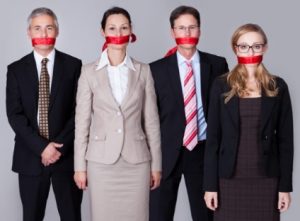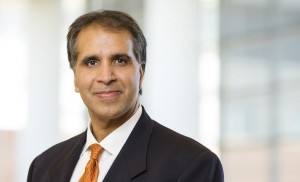 One issue confronting law school deans these days with increasing frequency and urgency is when we should (or shouldn’t) weigh in publicly on controversial matters of community concern, including matters on which our faculty colleagues may already be weighing in. One answer, offered by prominent and thoughtful legal education blogger Brian Leiter (also an accomplished law professor at the University of Chicago), is never: “It is not [a dean’s] role to express . . . opinions about positions defended by his faculty, either in their scholarship or in their contributions to public debate. . . [A] Dean[‘s] job is to defend freedom of speech and inquiry [of others.]”
One issue confronting law school deans these days with increasing frequency and urgency is when we should (or shouldn’t) weigh in publicly on controversial matters of community concern, including matters on which our faculty colleagues may already be weighing in. One answer, offered by prominent and thoughtful legal education blogger Brian Leiter (also an accomplished law professor at the University of Chicago), is never: “It is not [a dean’s] role to express . . . opinions about positions defended by his faculty, either in their scholarship or in their contributions to public debate. . . [A] Dean[‘s] job is to defend freedom of speech and inquiry [of others.]”
I appreciate where Brian is coming from, and embrace much of his thinking, but my approach may not be as absolutist as his. (I should note that the University of Chicago’s policy statements on free speech themselves are very laissez faire, and envision little or no role for speech by an academic institution or its leaders, except to set the ground rules for others to speak.)
For starters, I do think — sometimes at least — a dean or other high administrator is justified weighing in on controversial issues (even those in which her faculty are embroiled) if she does so by making clear that she is speaking as an individual (remember, most deans and other high administrators are themselves professors), not on behalf of the institution. For example, Brian criticizes University of Rochester President (and former law professor) Joel Seligman’s rebuke of one of his Rochester faculty members, Steven Landsburg, for Landsburg’s having attacked a Georgetown University law student who testified in Congress regarding abortion rights. According to Brian, “[Seligman] wrongly . . . invoked his own academic freedom to condemn remarks made by a member of the university’s faculty. But academic freedom does not protect the speech of administrators in their administrative capacities, nor should it.”
Here is what President Seligman had said about his own basis for issuing the rebuke to his faculty member:
Professor Landsburg has the right to express his views under our University’s deep commitment to academic freedom. And, of course, no reasonable person would ever assume that he speaks for the University of Rochester. I also have the right to express my views. I am outraged that any professor would demean a student in this fashion. To openly ridicule, mock, or jeer a student in this way is about the most offensive thing a professor can do. We are here to educate, to nurture, to inspire, not to engage in character assassination.
I think President Seligman’s mistake here was his failure to make crystal clear that he was speaking only for himself, and not for the University of Rochester; when a President of a university speaks, a reasonable person often would assume (unlike in the case of a faculty member) that he speaks for the University. And although I have a sense that President Seligman was attempting to assert only his personal — not institutional — views, he was not sufficiently explicit on that point. More generally, this potential for attribution perhaps should cause high-level administrators to pick their spots before they speak as individuals, even if they are quite clear about not speaking for the institution.
But shouldn’t institutional leaders sometimes be allowed (even encouraged) to speak on behalf of the institution? Surely there are some topics on which it is perfectly appropriate for deans and other academic leaders to weigh in on behalf of their schools. Suppose a university is committed to engaging in affirmative action in admissions. Wouldn’t it be fair for the university leaders to publicly respond to attacks on affirmative action publicly, reasserting why the institutions themselves support the policy and find attacks on it unavailing? Or take the question whether federal funding for research ought to be expanded or curtailed — another controversial topic. I don’t see a problem with university administrators weighing in publicly on this divisive issue to assert institutional perspectives and defend a particular point of view.

Why Better Billing Statements Can Improve Your Firm’s Finances—And Your Client Relationships
Outdated billing is costing law firms money. Discover how clear, modern billing practices boost profits, trust, and cash flow in 2025.
Beyond defending institutional policies and activities, I think administrators are also within their rights when they defend students themselves – even when those students are being criticized by faculty members at the same institution. For example, if in the (University of Rochester) episode above, Professor Landsburg had been attacking a Rochester student rather than a Georgetown Law student, I think President Seligman’s public rebuke might have been appropriate even on behalf of the University (rather than himself), since it is appropriate for a university to make known what it thinks are acceptable and unacceptable ways of treating its own students.
And beyond issues that are distinctively of interest to a university’s operations or its students’ well-being, there are some issues that are just so transcendent that university leaders are justified in commenting on them (even on behalf of the university) because everyone in the university community is so deeply affected by and interested in it. Imagine the Charlottesville episode last summer had no connection to a university (it did, in fact, because many events took place at or near the University of Virginia). In that case, would university leaders have been out of bounds to weigh in on the episode? (I rather doubt it.)
Two other quick points that I, as a dean, often need to think about in these matters: First, whatever I say that might be understood to be on behalf of the College of Law has to take account of what the President of the University of Illinois or the Chancellor or Provost of the Urbana-Champaign campus has already said or plans to say. University systems or campuses need not always speak in a single voice, but at the very least I want to know how my message might conflict with anyone else’s above me.
Second, I find it helpful to have small team of advisors — a handful of associate and assistant deans and faculty members — to help me think through what, if anything, is appropriate to say in response to some controversial incident, event or development. Having a group of people who regularly confer and offer advice in this realm tends to promote consistency as to the kinds of things that warrant any comment at all, and also as to the substance and tone of any such comments.
 Vikram Amar is the Dean of the University of Illinois College of Law, where he also serves the Iwan Foundation Professor of Law. His primary fields of teaching and study are constitutional law, federal courts, and civil and criminal procedure. A fuller bio and CV can be found at https://www.law.illinois.edu/faculty/profile/VikramAmar, and he can be reached at [email protected].
Vikram Amar is the Dean of the University of Illinois College of Law, where he also serves the Iwan Foundation Professor of Law. His primary fields of teaching and study are constitutional law, federal courts, and civil and criminal procedure. A fuller bio and CV can be found at https://www.law.illinois.edu/faculty/profile/VikramAmar, and he can be reached at [email protected].
